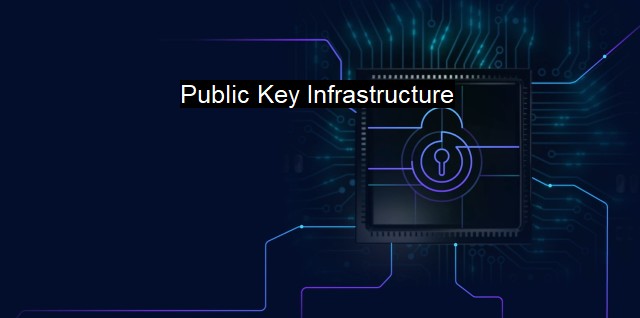What is Public Key Infrastructure?
The Importance of Public Key Infrastructure (PKI) for Securing Online Communications and Transactions
Public Key Infrastructure, often abbreviated as PKI, is an essential aspect of cybersecurity that serves as the backbone and frameworl for digital security and identification. It is a set of roles, policies, hardware, software, and procedures needed to generate, manage, store, distribute, and revoke digital certificates and public-key encryption. This infrastructure plays a crucial role with and it is integral to the successful blocking and aversion of cyber threats. Uniting cryptography with digital certificates, PKI provides a digital, robust, and tamperproof solution to increase security effectively and verify the entity's identity, whether it is an individual, device, or server.This system works on a complex series of cryptographic principles to provide an array of safety measures. When it comes to public key cryptography, PKI offers two types of keys; a public key which is known to everyone and a private key known only to the recipient of the message. This dichotomy of keys enhances the security system.
Whenever a user sends encrypted information, it is locked via the recipient’s public key. After receiving the encrypted data, the recipient deciphers it using their private key. This process ensures an additional layer of security so that even if the data is intercepted during transmission, the interceptor cannot unlock the data without the private key.
Equally important, PKI includes public key digital certificates, primarily serving as digital passports. These certificates provide authentic validation and identification of the key owner while also associating the owner with the public key. Information within the digital certificate includes the certificate holder’s name, certification validity duration, certificate serial number, and a copy of the public key.
It is crucial to maintain the trustworthiness of the certificates, which is achieved in PKI through Certificate Authorities (CA). The CA extracts identity information from client requests that are authenticated, then issue, revoke and manage digital certificates that establish trust between parties.
In the context of antivirus software, PKI is central to ensuring safe and secure interactions between a user and a website, between websites, or inter-device communications. Its functions influence antivirus solutions to a great extent by providing several potent advantages.
Firstly, PKI features mitigate phishing attacks. Reliable websites often use SSL/TLS certificates enabled by PKI to establish a secure connection between the user's browser and the server. When this happens, users can verify the site's legitimacy by clicking on the padlock icon next to the address bar in their web browser, which displays the certificate details. Effectively, if a company employs PKI, users can identify fraudulent sites attempting to mimic the company's site.
PKI can also implement robust tools such as hardware common access cards or security tokens, generating strong user authentication when accessing certain systems or data. This secure method enhances the virus software by ensuring that only authorized users can interact with sensitive data.
PKI provides for secure email communications by ensuring email signatures are legitimized and undisturbed, and that the recipients of an email are indeed intended recipients. This helps the antivirus software in identifying potential email threats and mitigating scenarios where malicious scripts are introduced via rogue emails.
To sum up, the Public Key Infrastructure is a significant component that ensures optimal functioning of digital security features. It meets needs for confidentiality, data integrity, authentication, and non-repudiation relevant to antivirus programs combating cybersecurity threats. The future of PKI appears promising, seeing that it is augmenting its solutions to building and expanding trust in evolving areas like Internet of Things (IoT) security and cloud security. Therefore, one can assert that PKI will continue to play a pivotal role in enhancing cybersecurity.

Public Key Infrastructure FAQs
What is Public Key Infrastructure (PKI)?
Public Key Infrastructure (PKI) is a collection of technologies, policies, and procedures that are used to manage digital certificates and public-private key pairs to secure communication over the internet.How does PKI work to ensure cybersecurity?
PKI works by enabling secure communication between two endpoints by encrypting the data being transmitted through the use of cryptographic keys. The use of public and private keys ensures that only authorized parties can access the information, thereby preventing unauthorized access and data breaches.What is the role of digital certificates in PKI?
Digital certificates are a critical component of PKI as they act as a digital ID card that verifies the identity of the website or individual accessing the information. Digital certificates enable secure communication by establishing a trusted connection, preventing man-in-the-middle attacks, and ensuring that sensitive information is only accessed by authorized parties.Why is PKI important for antivirus software?
PKI is an essential component for antivirus software as it enables secure communication between the antivirus server and the endpoint being protected. This allows for the secure delivery of updates and patches, preventing cybercriminals from intercepting and altering the antivirus software. Additionally, PKI ensures that only authorized software is installed on the endpoint, preventing malware and other cyber threats from infecting the system.| | A | | | B | | | C | | | D | | | E | | | F | | | G | | | H | | | I | | | J | | | K | | | L | | | M | |
| | N | | | O | | | P | | | Q | | | R | | | S | | | T | | | U | | | V | | | W | | | X | | | Y | | | Z | |
| | 1 | | | 2 | | | 3 | | | 4 | | | 7 | | | 8 | | |||||||